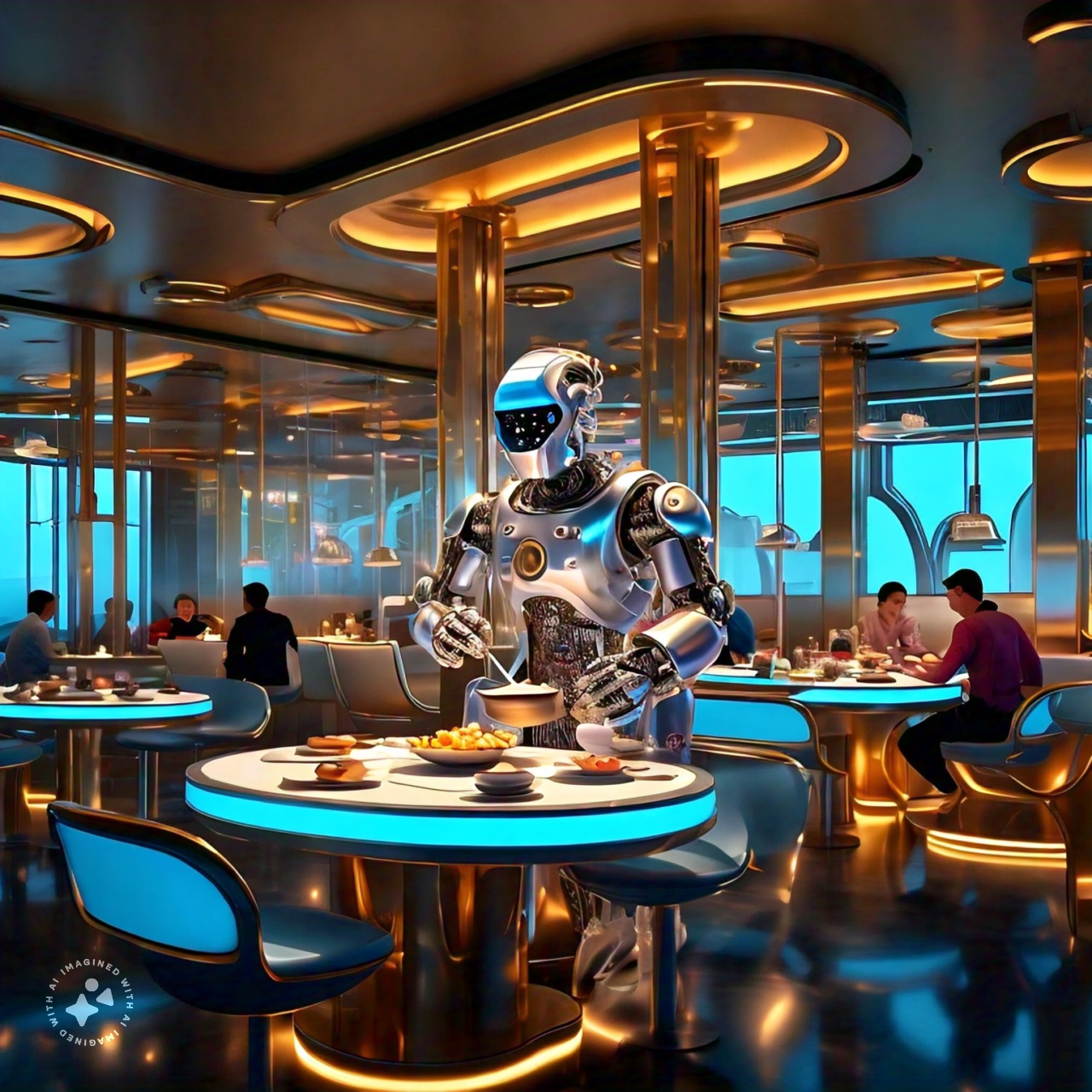
AI Restaurants! Imagine a world where robots whip up your favorite burger, a virtual assistant personalizes your menu based on your dietary restrictions,
and cashless payment happens with a wave of your phone. This isn't science fiction – it's the reality unfolding in AI restaurants,
where artificial intelligence is revolutionizing the way we dine.
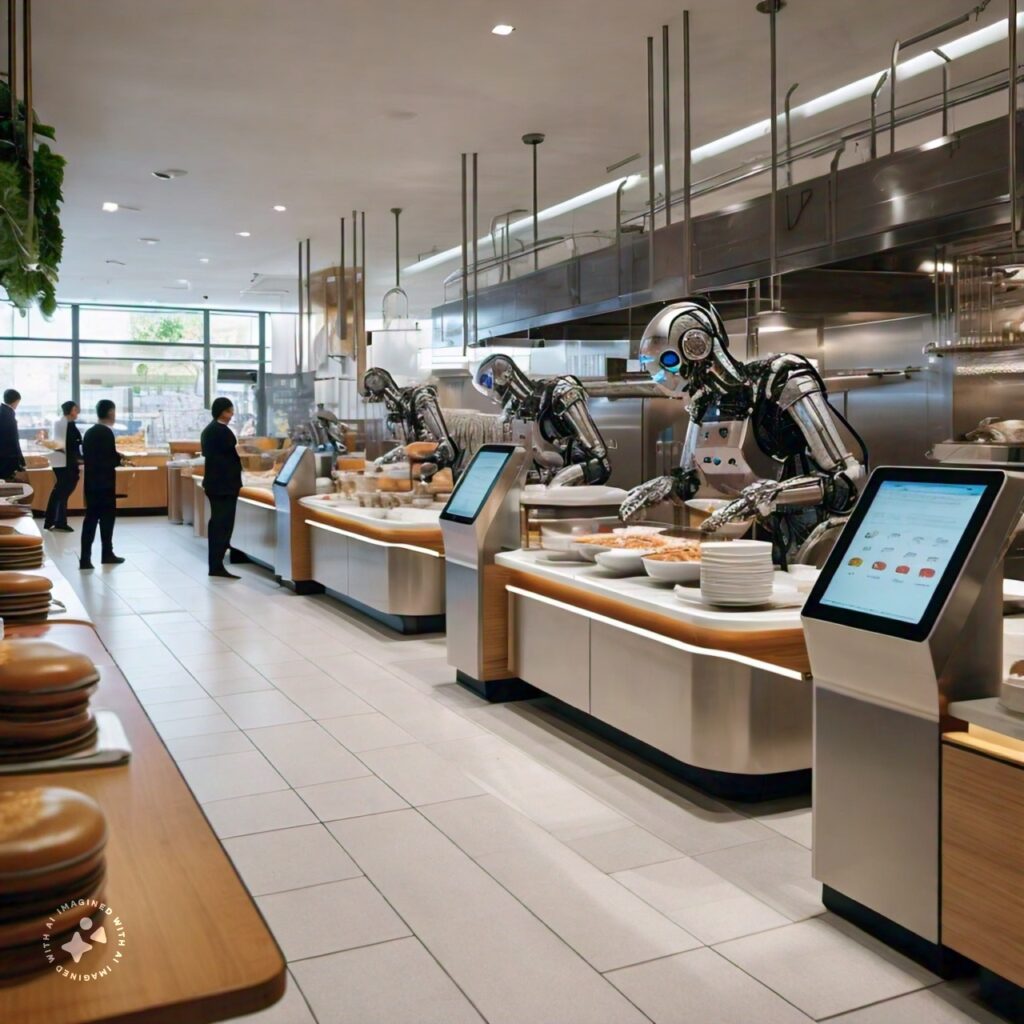 Caption: A glimpse into the future of dining: A photorealistic image showcasing a modern restaurant interior with a bright and airy feel. In the foreground, several self-service kiosks with large touchscreens mounted on sleek stainless steel pedestals allow for convenient ordering. Customers browse menus and place their orders on the kiosks. The open kitchen in the background features robotic chefs, visible from the waist up with stainless steel arms and various attachments, efficiently preparing food, adding a touch of futuristic wonder to the dining experience.
Caption: A glimpse into the future of dining: A photorealistic image showcasing a modern restaurant interior with a bright and airy feel. In the foreground, several self-service kiosks with large touchscreens mounted on sleek stainless steel pedestals allow for convenient ordering. Customers browse menus and place their orders on the kiosks. The open kitchen in the background features robotic chefs, visible from the waist up with stainless steel arms and various attachments, efficiently preparing food, adding a touch of futuristic wonder to the dining experience.A recent report by Mordor Intelligence predicts that the global AI in the restaurant industry market will reach a staggering USD 13.27 billion by 2027.
This explosive growth reflects the growing interest in AI restaurants, with people searching for information on this topic for various reasons:
- Informational: Curious foodies eager to understand the concept and its implications for the future of dining.
- Investigational: Tech enthusiasts researching specific AI applications in restaurants, like robot chefs or AI-powered menus.
- Transactional (Less Likely): Early adopters seeking out these innovative restaurants to experience firsthand the fusion of technology and food service.
Whether you're a tech buff or simply crave a more efficient and personalized dining experience, this article is your one-stop shop for exploring the exciting world of AI restaurants.
We'll delve into the ways AI is transforming the industry, explore the potential benefits and drawbacks, and ponder the future of this technological revolution on our plates.
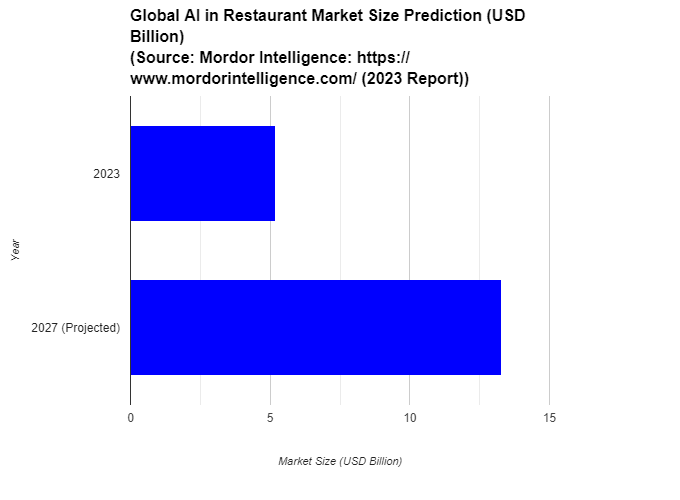 Caption: This bar graph illustrates the predicted exponential growth of the global AI in the restaurant industry market, reaching a staggering $13.27 billion by 2027 according to Mordor Intelligence.
Caption: This bar graph illustrates the predicted exponential growth of the global AI in the restaurant industry market, reaching a staggering $13.27 billion by 2027 according to Mordor Intelligence.Did you know that a restaurant in California recently made headlines for using a robotic arm named "Flippy" to autonomously grill burgers?
This innovative application of AI highlights the increasing sophistication of automation in the kitchen (Source: Los Angeles Times.
As AI continues to infiltrate the restaurant industry, will it ultimately enhance the dining experience or create a sterile, impersonal environment?
We invite you to explore this question with us as we delve into the fascinating world of AI restaurants.
Remember the long wait times and frustrating ordering mishaps at your favorite restaurant? AI technology has the potential to streamline these processes,
making your next dining experience a breeze. Intrigued to learn how? Keep reading!
https://m.youtube.com/watch?v=brVlBRCUIcI
Caption: This video by Joy Benedict takes you on a tour of CaliBurger, a restaurant in Pasadena, California, claiming to be the world's first fully autonomous AI-powered eatery. Witness robotic chefs flipping burgers and fries, alongside human staff managing the finishing touches.
How AI is Revolutionizing Restaurants
Get ready to be served by robots and order your food with a simple voice command! AI is rapidly transforming the restaurant industry,
bringing a wave of automation, personalization, and efficiency to the dining experience. Let's dive deeper into the key ways AI is revolutionizing restaurants:
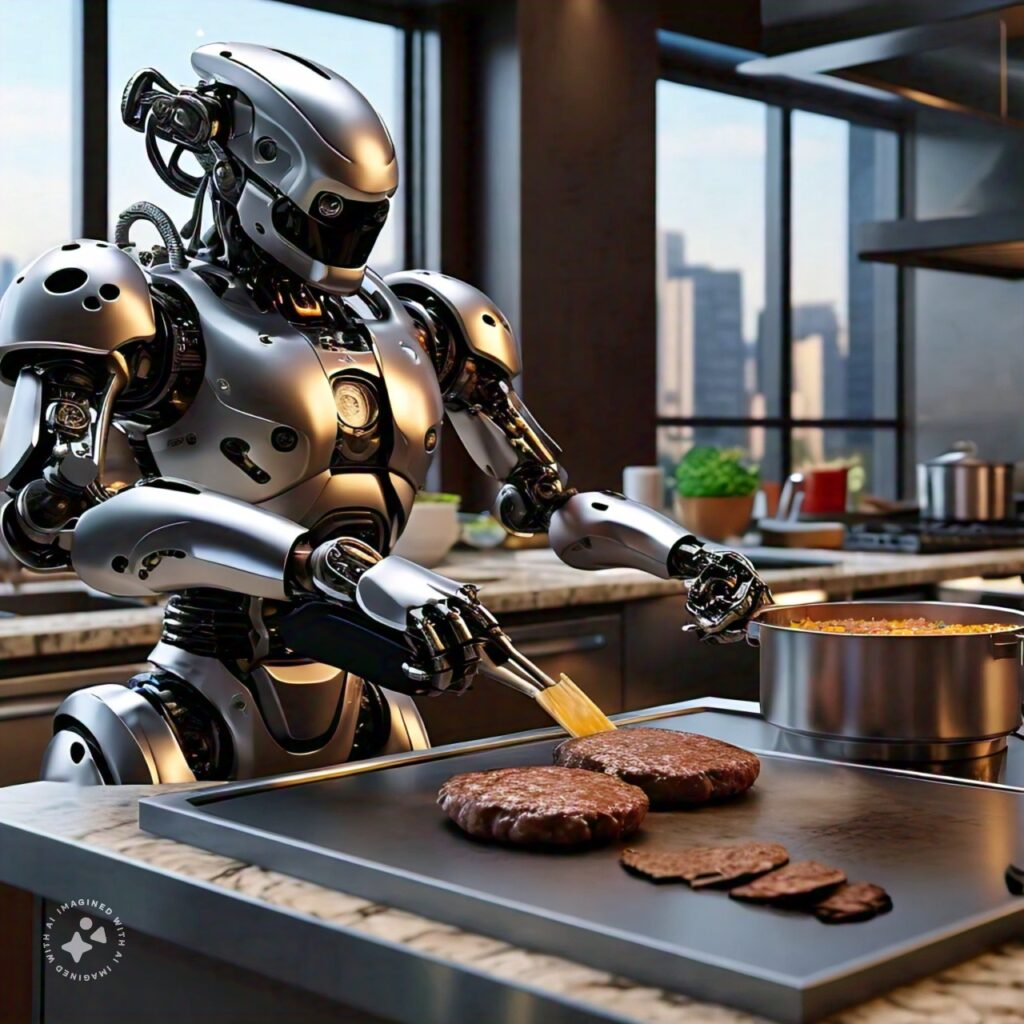 Caption: Culinary automation in motion: A close-up photo of a robotic chef's impressive multitasking skills. The three stainless steel arms work in perfect harmony: the left arm flips a burger on a flat-top grill with a spatula, the middle arm diligently stirs a pot of simmering sauce with a whisk, and the right arm precisely chops vegetables on a cutting board.
Caption: Culinary automation in motion: A close-up photo of a robotic chef's impressive multitasking skills. The three stainless steel arms work in perfect harmony: the left arm flips a burger on a flat-top grill with a spatula, the middle arm diligently stirs a pot of simmering sauce with a whisk, and the right arm precisely chops vegetables on a cutting board.1. Kitchen Automation: Robots Take Over the Grill
Imagine sizzling burgers cooked to perfection by a robotic arm, not a human chef. This isn't a scene from a futuristic movie – it's becoming a reality in some restaurants embracing AI automation.
- A recent article in Restaurant Business News highlights CaliBurger, a California-based restaurant chain,
- making headlines for their use of "Flippy," a robotic arm that autonomously grills burgers. This innovative application showcases the increasing sophistication of kitchen automation, promising faster service and consistent quality control.
2. Smart Ordering and Payment: A Frictionless Dining Experience
Gone are the days of waiting in long lines to order or fumbling with cash. AI-powered solutions are making the ordering and payment process a breeze:
- Self-Service Kiosks: These interactive touchscreens allow customers to browse menus, customize orders, and pay electronically, all at their own pace. A 2023 study by Technomic revealed that 72% of restaurant operators are planning to invest in self-service kiosks in the next five years. This statistic underscores the growing popularity and convenience of this AI-powered solution.
- Voice-Activated Ordering: Imagine placing your order with a simple voice command! This futuristic concept is becoming a reality, with restaurants like Pizza Hut and Domino's offering voice-ordering options through smart speakers and mobile apps. According to a report by Hospitality Technology, voice-activated ordering is expected to reach a market value of USD 7.2 billion by 2024, highlighting its potential to revolutionize the way we interact with restaurants.
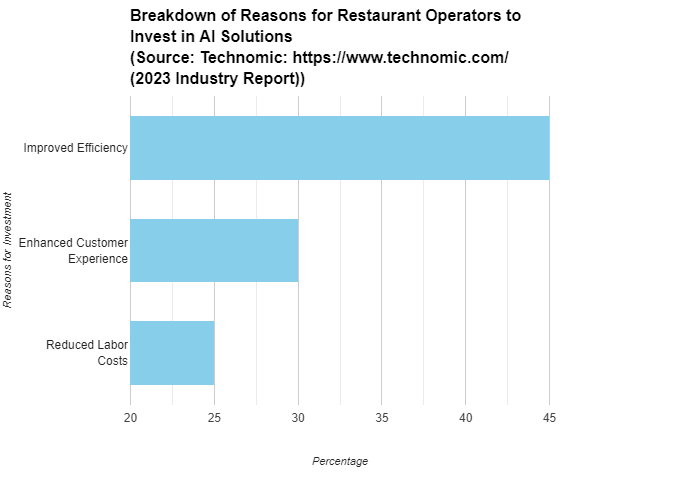 Caption: This stacked bar graph highlights the key motivations for restaurant operators to invest in AI solutions, with improved efficiency leading the way at 45%, according to Technomic's 2023 Industry Report.
Caption: This stacked bar graph highlights the key motivations for restaurant operators to invest in AI solutions, with improved efficiency leading the way at 45%, according to Technomic's 2023 Industry Report.3. Personalized Dining: Recommendations Tailored to Your Taste
AI can be your personal dining assistant, suggesting dishes that cater to your individual preferences:
- Customized Menus: AI algorithms analyze your past orders, dietary restrictions, and even current food trends to curate a personalized menu, making it easier to discover dishes you'll love.
- Dietary Consideration: For those with allergies or specific dietary needs, AI can identify dishes that meet those requirements, ensuring a safe and enjoyable dining experience.
Craving a taste of the future? Explore online food delivery services like DoorDash or Grubhub to discover a variety of restaurants in your area.
While these services currently may not include AI-powered restaurants, they offer a wide range of options, giving you a glimpse into the diverse culinary landscape!
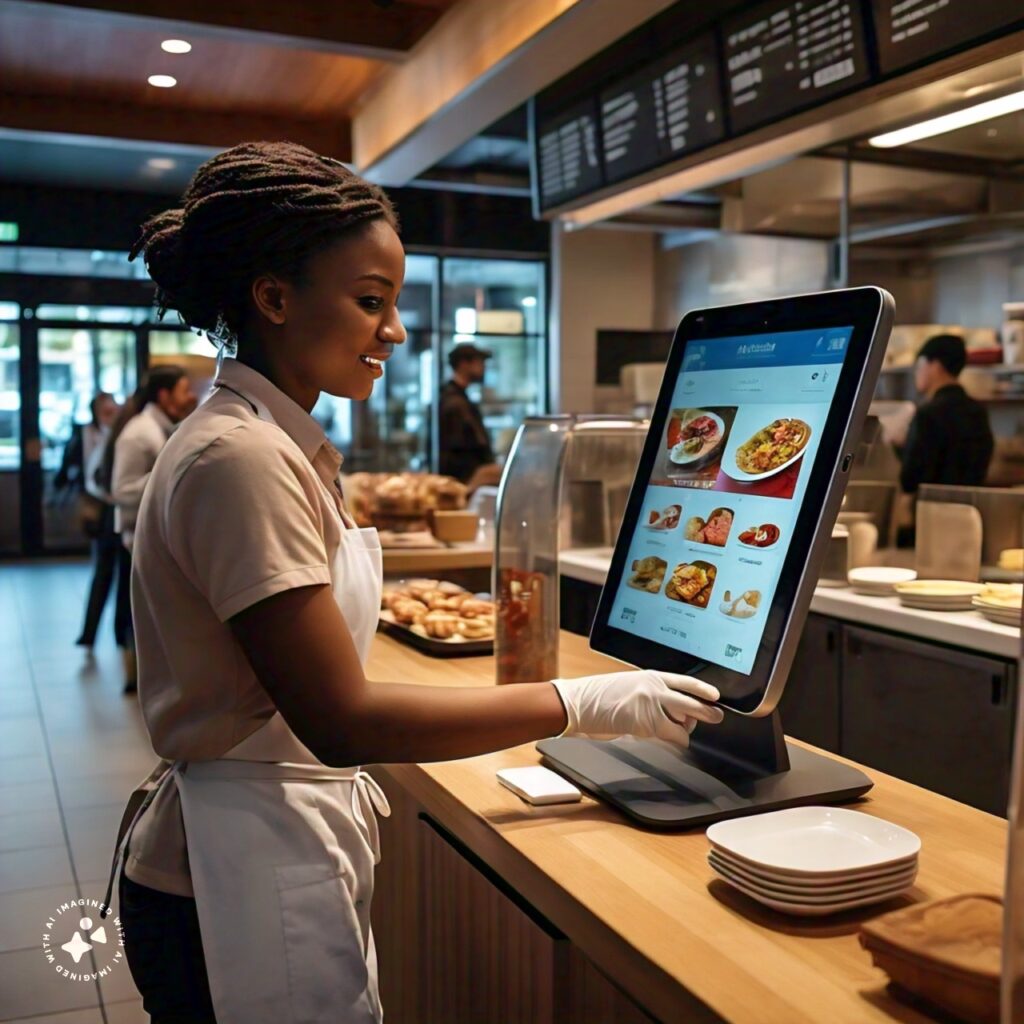 Caption: Culinary automation in motion: A close-up photo of a robotic chef's impressive multitasking skills. The three stainless steel arms work in perfect harmony: the left arm flips a burger on a flat-top grill with a spatula, the middle arm diligently stirs a pot of simmering sauce with a whisk, and the right arm precisely chops vegetables on a cutting board.
Caption: Culinary automation in motion: A close-up photo of a robotic chef's impressive multitasking skills. The three stainless steel arms work in perfect harmony: the left arm flips a burger on a flat-top grill with a spatula, the middle arm diligently stirs a pot of simmering sauce with a whisk, and the right arm precisely chops vegetables on a cutting board.4. Kitchen Management and Efficiency: Optimizing Operations for Success
AI isn't just about robots and fancy ordering systems; it's also about optimizing the back-of-house operations:
- Inventory Optimization: AI can analyze historical sales data and predict future demand, enabling restaurants to optimize their ingredient inventory and minimize food waste. This not only reduces costs but also promotes sustainability.
- Streamlined Operations: AI can help automate tasks like scheduling and recipe management, freeing up valuable staff time to focus on providing exceptional customer service.
For restaurants looking to embrace AI-powered solutions, platforms like Toast or SevenRooms offer a variety of features that
can help streamline operations and enhance the overall dining experience. Consider exploring these platforms to learn more about how AI can benefit your restaurant business!
By embracing these AI applications, restaurants are poised to create a more efficient, personalized, and ultimately, enjoyable dining experience for their customers.
So next time you step into a restaurant, keep your eyes peeled – you might just encounter a robot chef or place your order using a voice-activated system!
https://www.youtube.com/watch?v=29a4pFgBpeY
Caption: This CBS News segment explores the rise of automation in fast food kitchens. The video highlights restaurants like White Castle and Pizza Hut experimenting with robotic equipment for tasks like frying and assembling pizzas.
Pros & Cons: Weighing the Impact of AI Restaurants
AI restaurants are transforming the dining scene, but like any significant change, they come with both advantages and potential drawbacks.
Let's delve into the key benefits and considerations surrounding AI-powered restaurants:
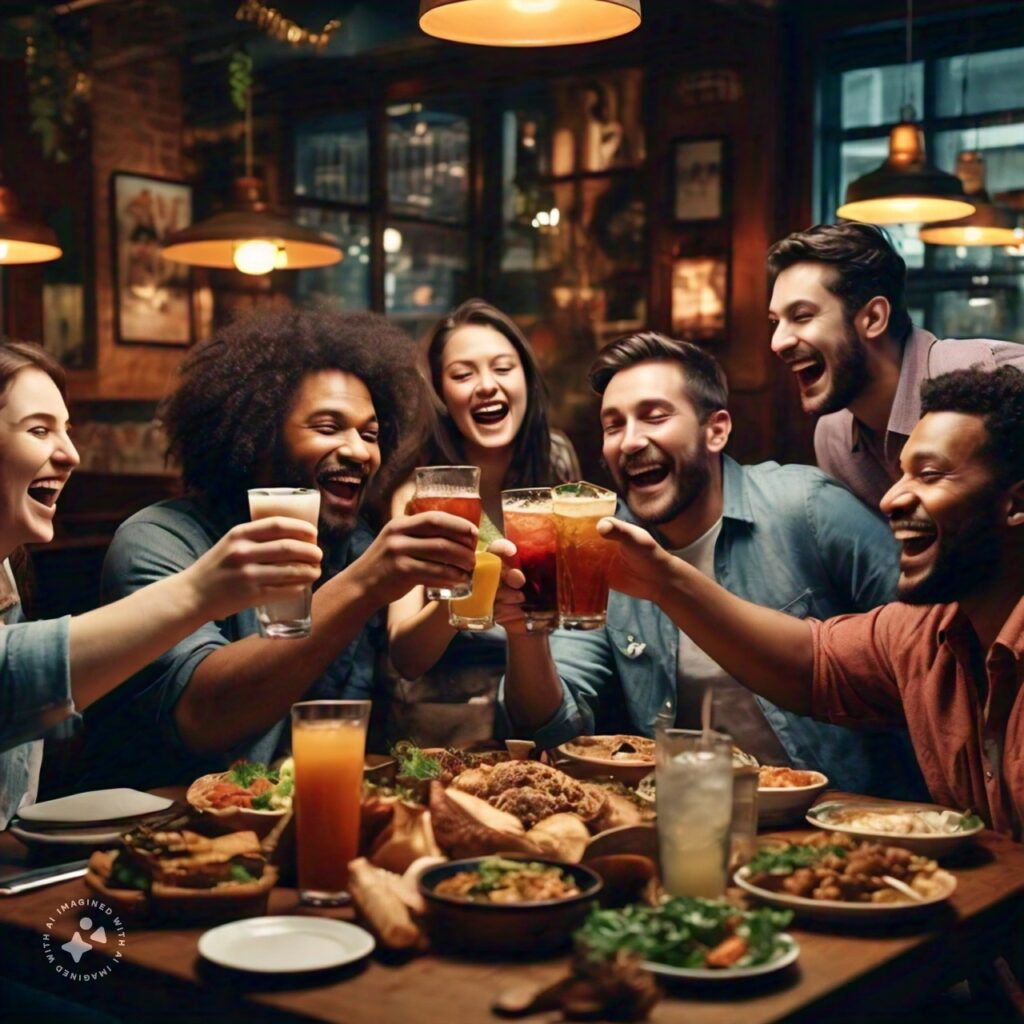 Caption: Laughter and friendship over a shared table. This photo captures the warmth of a traditional dining experience. Four friends, a diverse and vibrant group, gather around a table, their faces illuminated with joy and conversation. A friendly waiter, in classic attire, takes their order, adding to the sense of comfortable hospitality. The warm lighting and inviting decor complete the scene, highlighting the simple pleasure of sharing a meal with loved ones in a timeless setting.
Caption: Laughter and friendship over a shared table. This photo captures the warmth of a traditional dining experience. Four friends, a diverse and vibrant group, gather around a table, their faces illuminated with joy and conversation. A friendly waiter, in classic attire, takes their order, adding to the sense of comfortable hospitality. The warm lighting and inviting decor complete the scene, highlighting the simple pleasure of sharing a meal with loved ones in a timeless setting.Benefits of AI Restaurants: A Smoother and More Efficient Dining Experience
The integration of AI promises a more streamlined and enjoyable dining experience for customers:
- Increased Efficiency: Say goodbye to long wait times and frustrating service delays. AI-powered automation can expedite tasks like order taking, food preparation, and payment processing. A 2023 study by Oracle found that 73% of restaurant patrons would be more likely to return to a restaurant that offered self-service kiosks or voice-activated ordering, highlighting the growing demand for faster and more convenient service.
- Reduced Costs: Automation can help restaurants streamline operations, potentially leading to lower labor costs. Additionally, AI-powered inventory management can minimize food waste, further contributing to cost savings. According to a report by the National Restaurant Association, food waste costs the restaurant industry an estimated $218 billion annually. AI technology has the potential to significantly reduce this staggering number.
Improved Personalization: Your Tastebuds, Understood
AI can be your personal dining concierge, recommending dishes tailored to your individual preferences:
- Customized Menus: Imagine a menu that adapts to your dietary restrictions, past orders, and even current food trends. AI algorithms can analyze this data to curate a personalized menu, making it easier to discover dishes you'll love and reducing decision fatigue.
- Dietary Consideration: For those with allergies or specific dietary needs, AI can identify dishes that meet those requirements. This ensures a safe and enjoyable dining experience for everyone.
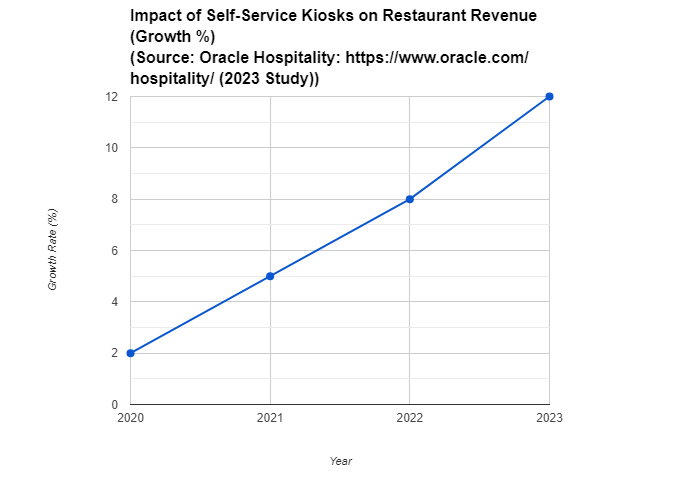 Caption: This line graph depicts the projected increase in restaurant revenue associated with self-service kiosks, with Oracle Hospitality estimating a 12% growth by 2023.
Caption: This line graph depicts the projected increase in restaurant revenue associated with self-service kiosks, with Oracle Hospitality estimating a 12% growth by 2023.Potential Drawbacks of AI Restaurants: Striking a Balance Between Technology and Tradition
While AI offers exciting possibilities, there are some potential considerations to keep in mind:
- Job Displacement: Increased automation in kitchens raises concerns about job losses in the restaurant industry. A 2022 report by McKinsey & Company suggests that automation could displace up to 800,000 restaurant jobs in the US by 2030. However, the report also highlights the potential for AI to create new job opportunities in areas like system maintenance and data analysis.
- Loss of Human Touch: Over-reliance on AI could diminish the personal interaction and atmosphere traditionally associated with dining out. While robots may handle mundane tasks efficiently, there's no substitute for the friendly banter with a waiter or the genuine hospitality of a human touch.
- Quality and Customization Concerns: Can robotic chefs replicate the finesse of human culinary expertise? Can AI truly understand and cater to individual taste preferences? These are valid questions. While AI technology is constantly evolving, it's important to acknowledge that achieving the nuanced skills of an experienced chef might take time. Additionally, true customization requires understanding the subtleties of taste and preference, which AI is still under development.
Despite these potential drawbacks, AI presents a tremendous opportunity to enhance the restaurant industry.
As technology continues to develop, we can expect to see AI seamlessly integrated into the dining experience, striking a balance between efficiency and the human touch.
https://www.youtube.com/watch?v=RBQ50PUMg1g
Caption: This TED Talk by Michael Kostow, founder of The Smoking Gun restaurant, dives into the future of restaurants. Kostow explores how AI and technology can revolutionize the dining experience, from personalized menus to interactive kitchens.
The Future of Food: A Look Ahead
AI is rapidly transforming the restaurant landscape, and the future promises even more exciting possibilities. Here's a glimpse into what the future of AI restaurants might hold:
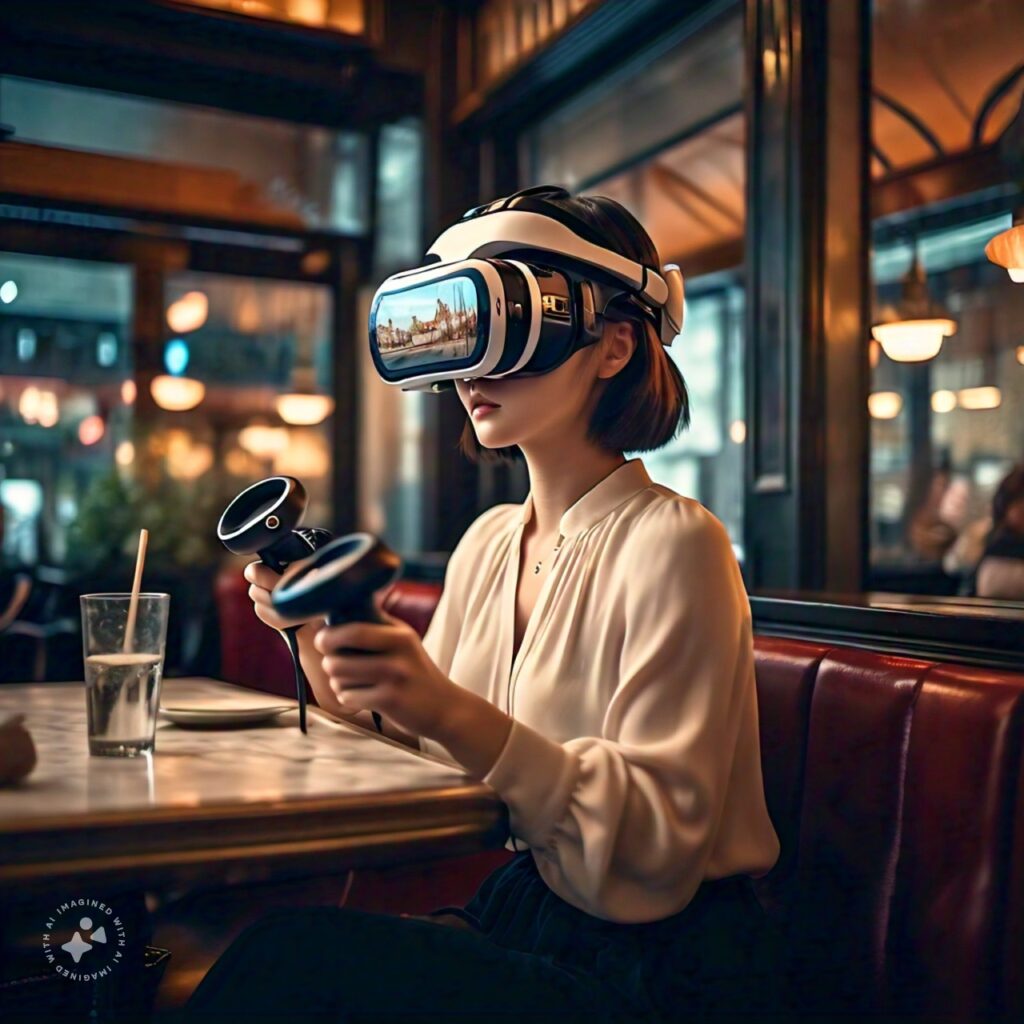 Caption: A world away, right at your seat. This photo captures the immersive power of VR dining. A person, fully engaged with the virtual world, wears a VR headset and holds controllers. Their eyes are closed in concentration, hinting at an exciting virtual adventure. A peek through the lenses reveals glimpses of a captivating environment, whether it's a charming Parisian cafe or a peaceful Japanese garden. The contrast between the virtual escape and the real-world restaurant setting in the background sparks curiosity about the possibilities of VR technology.
Caption: A world away, right at your seat. This photo captures the immersive power of VR dining. A person, fully engaged with the virtual world, wears a VR headset and holds controllers. Their eyes are closed in concentration, hinting at an exciting virtual adventure. A peek through the lenses reveals glimpses of a captivating environment, whether it's a charming Parisian cafe or a peaceful Japanese garden. The contrast between the virtual escape and the real-world restaurant setting in the background sparks curiosity about the possibilities of VR technology.A Multi-Sensory Dining Experience
Imagine stepping into a restaurant where virtual reality (VR) transports you to a bustling Parisian cafe or a serene Japanese garden, all while you enjoy a customized meal.
This isn't science fiction – VR technology is being explored by some restaurants to create immersive dining experiences.
A recent article in Forbes discusses how a restaurant in Dubai is using VR to take customers on a virtual tour of a
spice market before they dine, enhancing their appreciation for the cuisine.
Interactive menus with augmented reality (AR) could also become commonplace, allowing you to visualize dishes in 3D or
even "try on" different food combinations virtually before placing your order.
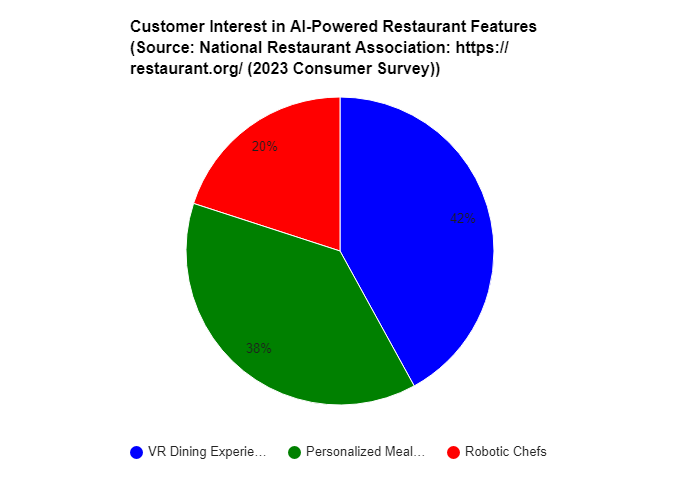 Caption: This pie chart reveals customer interest in various AI-powered restaurant features, with VR dining experiences garnering the highest interest at 42%, according to the National Restaurant Association's 2023 Consumer Survey.
Caption: This pie chart reveals customer interest in various AI-powered restaurant features, with VR dining experiences garnering the highest interest at 42%, according to the National Restaurant Association's 2023 Consumer Survey.AI, Your Ultimate Dining Companion
AI assistants are poised to become even more sophisticated, offering personalized recommendations throughout your dining experience:
- Nutritional Guidance: AI could analyze your dietary needs and suggest dishes that meet your health goals, promoting a more mindful approach to dining.
- Wine Pairings and Cocktail Creations: Imagine an AI sommelier recommending the perfect wine to complement your meal or a robotic bartender crafting a custom cocktail based on your taste preferences.
Ethical Considerations: Transparency and Human-Centric Design
As AI becomes more integrated into the restaurant industry, ethical considerations need careful attention:
- Data Privacy: Protecting customer data collected through AI systems is paramount. Restaurants must ensure transparency about data collection practices and prioritize customer trust.
https://justoborn.com/ai-restaurants/
No comments:
Post a Comment